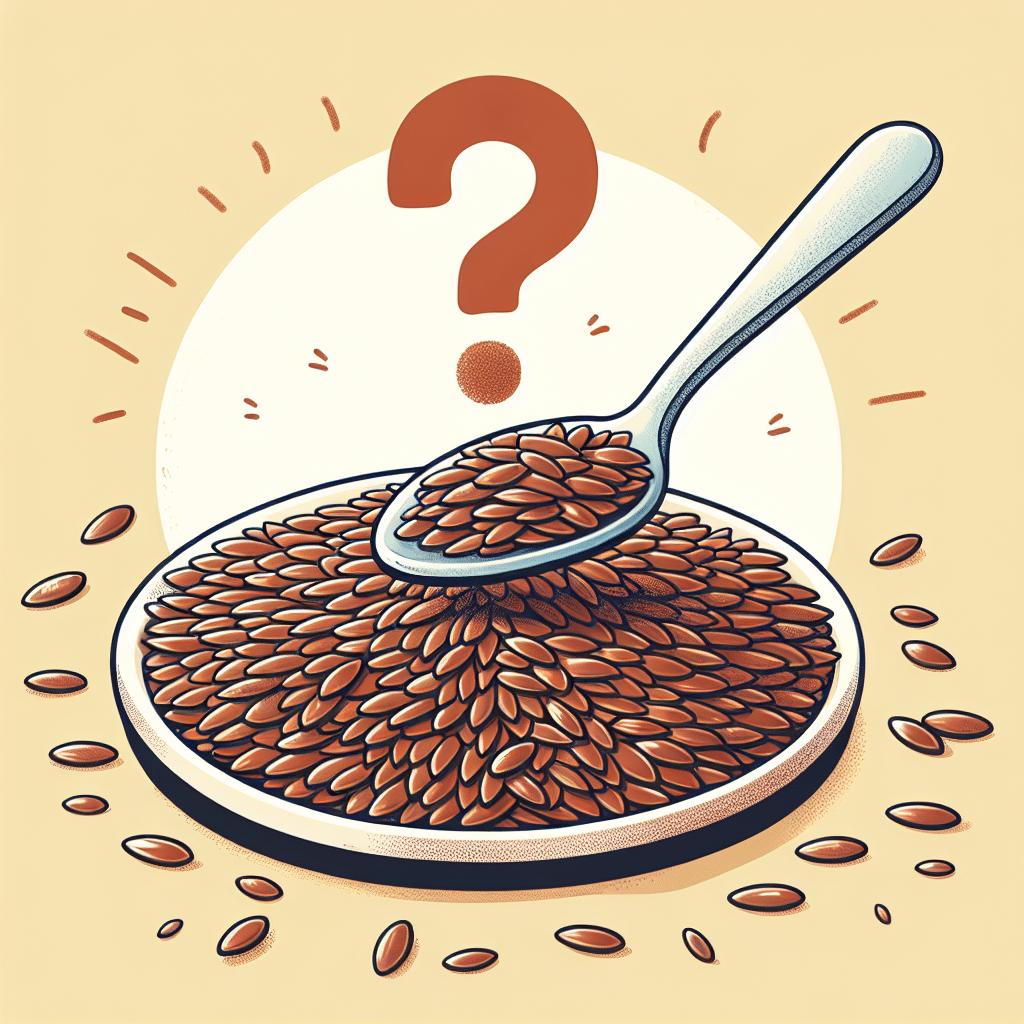Can You Eat Flax Seeds Raw?
-
Table of Contents
- Flax Seeds Raw Consumption: Benefits, Risks, and Recommendations
- Understanding Flax Seeds
- Can You Eat Flax Seeds Raw?
- Benefits of Eating Raw Flax Seeds
- Potential Risks and Considerations
- Optimizing Nutrient Absorption from Raw Flax Seeds
- Incorporating Raw Flax Seeds into Your Diet
- Case Studies and Statistics
- Conclusion: Embracing Raw Flax Seeds for Health
- Discover ETprotein’s Premium Protein Products
Flax Seeds Raw Consumption: Benefits, Risks, and Recommendations

Flax seeds, also known as linseeds, have gained popularity in the health food scene due to their rich nutritional profile. They are a great source of omega-3 fatty acids, fiber, and lignans, which are known for their antioxidant properties. However, when it comes to consuming flax seeds, there is often a debate about whether it is safe and beneficial to eat them raw. This article delves into the topic, exploring the advantages and potential concerns associated with eating raw flax seeds, supported by scientific research and expert opinions.
Understanding Flax Seeds
Flax seeds come from the flax plant (Linum usitatissimum), which has been cultivated for thousands of years for its fibers and seeds. The seeds are small, brown, or golden-colored and can be consumed whole, ground, or pressed into oil. They are known for their health-promoting compounds, which include:
- Alpha-linolenic acid (ALA), a type of omega-3 fatty acid
- Dietary fiber, both soluble and insoluble
- Lignans, which have estrogenic properties and act as antioxidants
- High-quality protein
- Vitamins and minerals such as vitamin B1, magnesium, and zinc
Can You Eat Flax Seeds Raw?
Yes, it is possible to eat flax seeds raw. In fact, consuming them in their raw state ensures that you get the maximum amount of nutrients, as some can be lost during the cooking process. However, there are certain considerations to keep in mind to optimize nutrient absorption and digestion.
Benefits of Eating Raw Flax Seeds
Eating raw flax seeds can offer several health benefits:
- Omega-3 Fatty Acids: Raw flax seeds are a rich source of ALA, which is converted into EPA and DHA in the body, contributing to heart health and reducing inflammation.
- Dietary Fiber: The high fiber content aids in digestion, helps maintain bowel regularity, and can assist in managing blood sugar levels.
- Lignans: These compounds have been linked to a reduced risk of certain cancers and may have a positive effect on hormonal balance.
- Antioxidant Properties: The antioxidants present in flax seeds can help combat oxidative stress and may reduce the risk of chronic diseases.
Potential Risks and Considerations
While raw flax seeds are nutritious, there are some potential risks to consider:
- Cyanogenic Glycosides: Flax seeds contain cyanogenic glycosides, which can release cyanide when metabolized. However, the amount present in flax seeds is generally considered to be safe for human consumption when eaten in moderation.
- Digestibility: Whole flax seeds may pass through the digestive system without being fully broken down, which means you might not absorb all the nutrients.
- Phytic Acid: This natural compound can bind to minerals and reduce their absorption. Soaking or sprouting flax seeds can help reduce phytic acid content.
Optimizing Nutrient Absorption from Raw Flax Seeds
To maximize the health benefits and minimize any risks associated with eating raw flax seeds, consider the following tips:
- Grinding: Ground flax seeds are more easily digested, allowing for better absorption of nutrients.
- Soaking: Soaking flax seeds can help reduce phytic acid and improve digestibility.
- Moderation: Consume flax seeds in moderation to avoid any potential negative effects from cyanogenic glycosides.
- Storage: Store flax seeds in a cool, dark place to preserve their fatty acids and prevent rancidity.
Incorporating Raw Flax Seeds into Your Diet
Raw flax seeds can be a versatile addition to your diet. Here are some ways to include them:
- Add ground flax seeds to smoothies, oatmeal, or yogurt.
- Use them as an egg substitute in baking by mixing ground flax seeds with water.
- Sprinkle whole or ground flax seeds over salads or soups.
- Incorporate them into homemade granola or energy bars.
Case Studies and Statistics
Several studies have highlighted the benefits of flax seeds in the diet. For instance, a study published in the “American Journal of Clinical Nutrition” found that flax seeds can lower cholesterol levels, particularly in individuals with high cholesterol. Another study in the “Journal of Nutrition” suggested that flax seeds might help reduce blood pressure.
Statistics show that the inclusion of flax seeds in diets is on the rise. According to the Flax Council of Canada, the use of flax seeds has increased due to their health benefits and versatility in food applications.
Conclusion: Embracing Raw Flax Seeds for Health
In conclusion, raw flax seeds can be a nutritious addition to your diet when consumed properly. They offer a wealth of health benefits, including improved heart health, better digestion, and potential cancer-fighting properties. By grinding, soaking, and eating them in moderation, you can maximize their nutritional value and minimize any potential risks. As with any dietary change, it’s wise to consult with a healthcare professional, especially if you have specific health concerns or conditions.
Discover ETprotein’s Premium Protein Products
If you’re looking to enhance your diet with high-quality protein sources, consider ETprotein’s range of organic bulk vegan proteins. Their products, including various seed proteins, are characterized by a neutral taste, non-GMO, allergen-free attributes, and high purity levels. Whether you’re involved in the nutraceutical, pharmaceutical, or food and beverage industries, ETprotein offers comprehensive solutions to meet all your protein needs.
About ETprotein:
ETprotein, a reputable protein and L-(+)-Ergothioneine (EGT) Chinese factory manufacturer and supplier, is renowned for producing, stocking, exporting, and delivering the highest quality organic bulk vegan proteins and L-(+)-Ergothioneine. They include Organic rice protein, clear rice protein, pea protein, clear pea protein, watermelon seed protein, pumpkin seed protein, sunflower seed protein, mung bean protein, peanut protein, and L-(+)-Ergothioneine EGT Pharmaceutical grade, L-(+)-Ergothioneine EGT food grade, L-(+)-Ergothioneine EGT cosmetic grade, L-(+)-Ergothioneine EGT reference grade and L-(+)-Ergothioneine EGT standard. Their offerings, characterized by a neutral taste, non-GMO, allergen-free attributes, with L-(+)-Ergothioneine purity over 98%, 99%, cater to a diverse range of industries. They serve nutraceutical, pharmaceutical, cosmeceutical, veterinary, as well as food and beverage finished product distributors, traders, and manufacturers across Europe, USA, Canada, Australia, Thailand, Japan, Korea, Brazil, and Chile, among others.
ETprotein specialization includes exporting and delivering tailor-made protein powder and finished nutritional supplements. Their extensive product range covers sectors like Food and Beverage, Sports Nutrition, Weight Management, Dietary Supplements, Health and Wellness Products, and Infant Formula, ensuring comprehensive solutions to meet all your protein needs.
As a trusted company by leading global food and beverage brands and Fortune 500 companies, ETprotein reinforces China’s reputation in the global arena. For more information or to sample their products, please contact them and email sales(at)ETprotein.com today.














